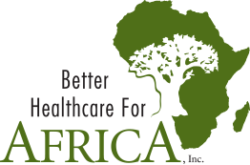Readers may recall that when Luke Hingson, president of detained by customs at Harare airport. Two of these were suitcases carried by Luke and Mary containing supplies provided by Brother’s Brother and Hospital Sisters. The third was one of two duffels I’d carried for Better Healthcare for Africa. Together the duffels contained three autoclavable containers of surgical instruments provided by Brother’s Brother, 550 sutures donated by Global Links, and supplies obtained by BHA that included suture; bandages; gastric tubes; surgical gloves, masks, gowns and drapes; and two teaching models for the midwife program. We left with our suitcases of personal items, which also contained a small amount of supplies. Mine also contained children’s books and other nonmedical items for the hospital.
The detention of the bags was a blow to all of us because the supplies they carried were to be distributed to five mission hospitals we were to visit over the next three days. In addition, one of my duffels hadn’t made it to Harare and remained in Addis Ababa. Fortunately, we were able to pick up the duffle left in Addis the next day and take it with us. So we had these items, along with some that Luke and Mary had packed in their suitcases of personal belongings. Thus, we had some items to pass out at the hospitals. In the end, good also came from the detention of our bags by customs.
Luke phoned Brother’s Brother from Elizabeth’s and arranged to have the papers needed for the duty-free certificate sent by email. Mildred, Elizabeth’s extraordinary and indefatigable assistant at the Catholic Health Commission, then took over pursuit of the certificate. It would take time, she was told; several signatures were needed in the Ministry of Health.
After visiting the five mission hospitals, and following a meeting with the Zimbabwe Association of Church-related Hospitals (ZACH) in Harare, Luke and Mary traveled 100 miles northeast to spend several days at Nyadire mission hospital, a Methodist hospital, and I went with Elizabeth to St. Albert’s, a Catholic hospital 120 miles north of Harare. When Luke and Mary departed Zimbabwe March 6, we still didn’t have the bags. Mildred remained on the case, and it looked like we might be able to pick up the bags the day I left on March 9th.
Elizabeth and I arrived at the airport early with that expectation. We entered the low, ordinary customs building located about a quarter mile from the terminal and were led along a bank of windows to the far end. There Elizabeth learned, to her consternation, that the certificate was not ready, but there still seemed a sense that we might yet pick it up.
As Elizabeth discussed the matter in sometimes-heated Shona with two clerks who came and went, I watched a young man behind the glass who was sitting at a desk covered with papers. He was smartly groomed: hair cut to the scalp, gold-rimmed glasses gleaming against a coffee-brown complexion, dark suit, starched white shirt and red tie. Very professional. He sat straight in his chair inspecting and stamping the pages of multi-page forms. He’d glance at a page, bang the chrome stamper down, then go to the next page. He placed the finished form to his right, reached for another to his left and begin the process again.
Was our application among his papers, I wondered? The young man was still at it when we left 20 or 30 minutes later. I pictured Monty Python’s John Cleese wielding the stamper.
I was late for my flight. Elizabeth dropped me at the sidewalk, and I hurried into the terminal. Fortunately, there were no lines at the counter—Harare airport isn’t the travel hub it once was. Elizabeth was there for a quick goodbye, and I made it to the shuttle bus taking passengers to the Air Botswana turboprop waiting on the tarmac for the flight to Gaborone.
The bags finally cleared customs at 3:30 that afternoon, and Elizabeth picked them up. During these events, Mildred, had been in touch with Nyadire hospital and a woman named Petronella at the United Methodist Church Zimbabwe Health Board, about the status of the detained bags. Through these exchanges, Elizabeth learned that Nyadire had an urgent need for suture and bandages and could perform only emergency procedures. (Nyadire was also vexed by sporadic electrical service, along with St. Albert’s and most of Zimbabwe.)
With the bags in hand, Elizabeth emailed Drew Harvey, a Brother’s Brother board member who was also visiting Nyadire Hospital: “This is just for your information regarding the famous detained 2 suitcases and bag. I am going to give Luke’s suitcases and all the contents inside to Petronella for the Methodist Hospitals, since we did not visit even one as a team. [St. Albert’s will take] the sutures and gloves only that are in Darrell’s bag. The two containers with instruments from Darrell’s bag as well, I am also going to give them to the Methodist Hospitals also through Petronella.”
St. Albert’s and the Catholic Health Commission had had little previous interaction with Nyadire and the Methodist hospitals in the country, but the two had been connected through the famous detained bags, and in a separate email Elizabeth wrote to Drew, “Surely this is the start of working together; all Church work be it in Hospital, Mission, etc. is for the common good and for the Glory of God. Wishing you a safe journey back home. Keep up the good work you are doing for the Zimbabweans. Dr. Tarira.”
And so came the happy close to the case of the customized bags.
Darrell
